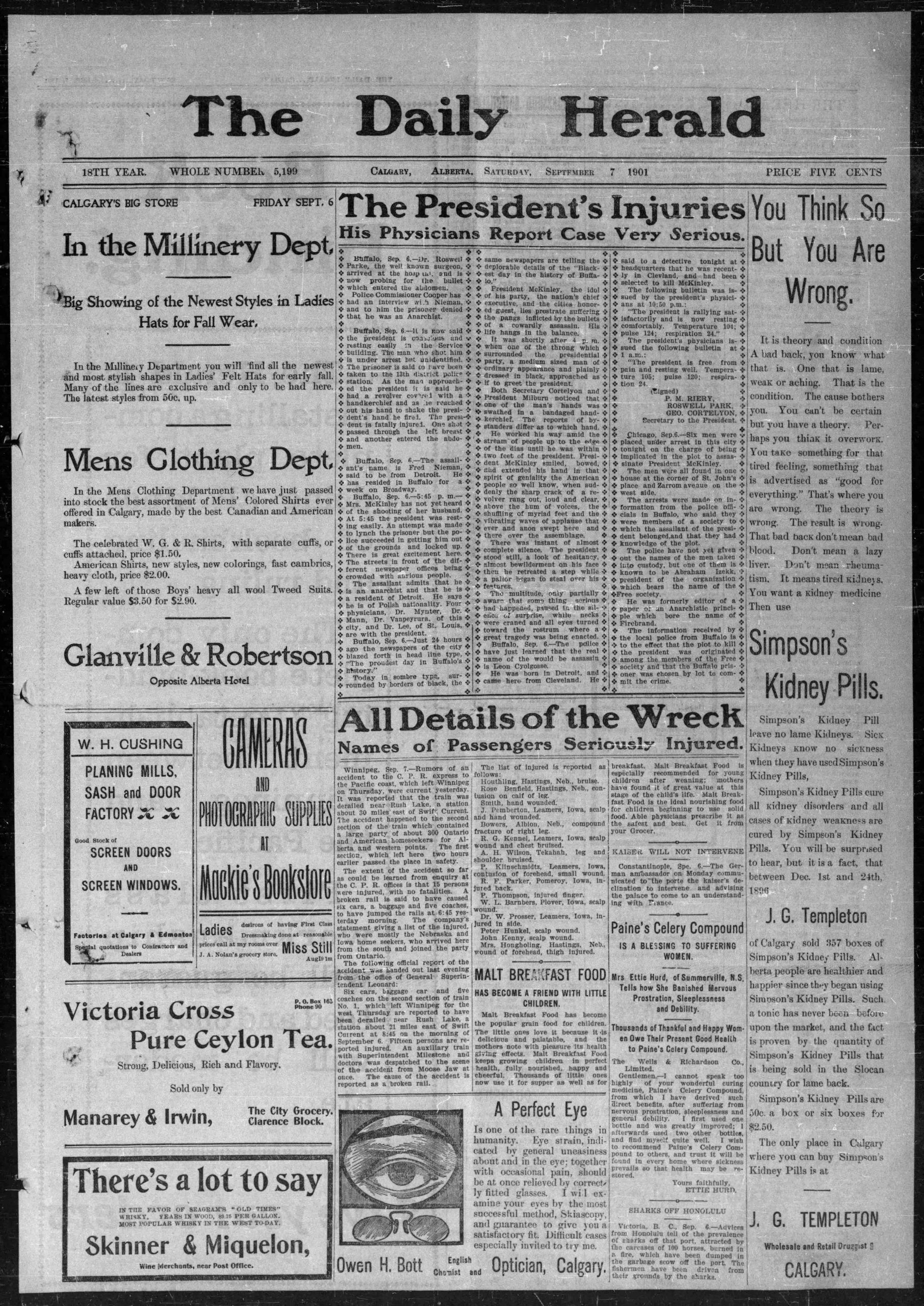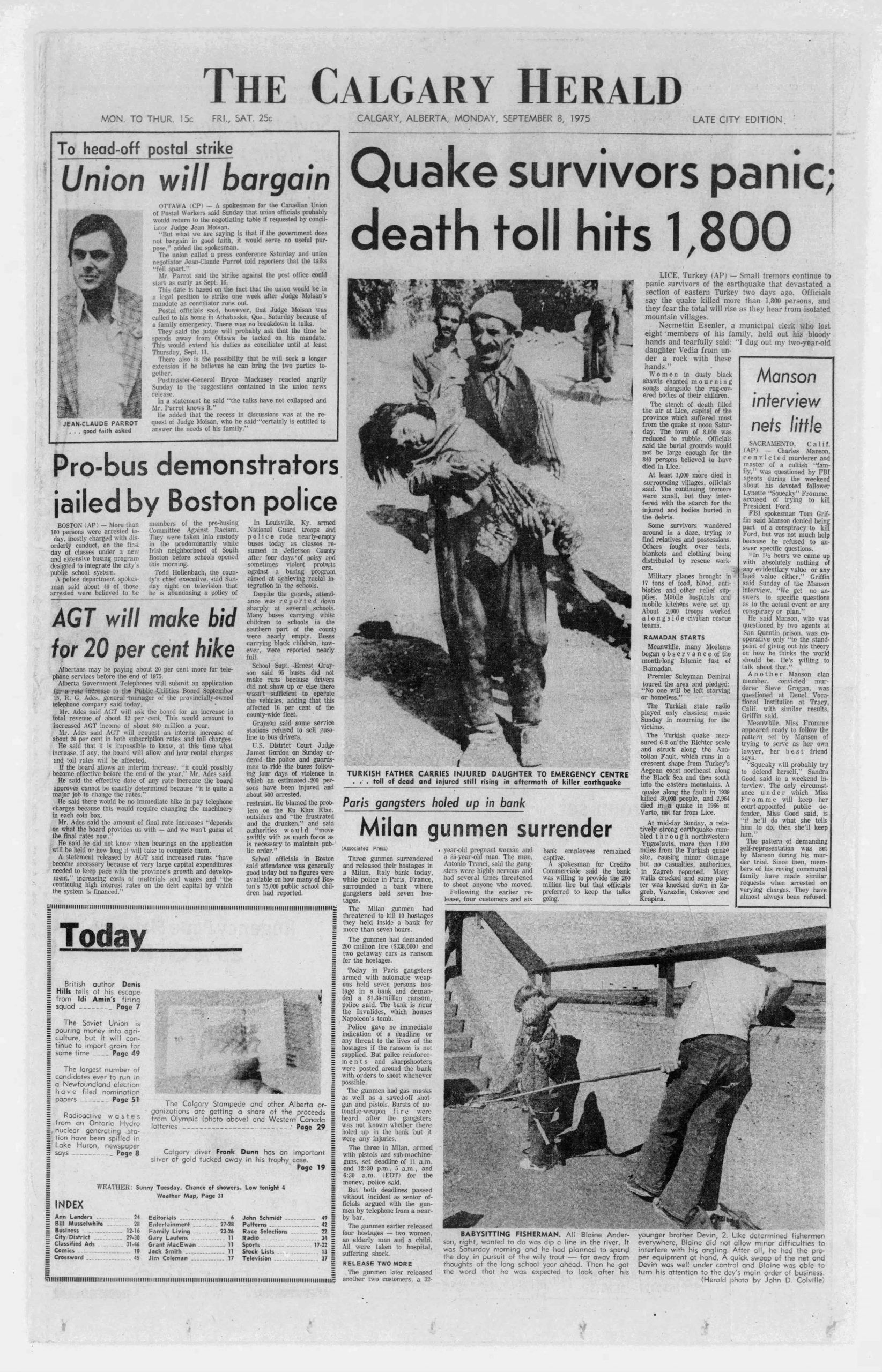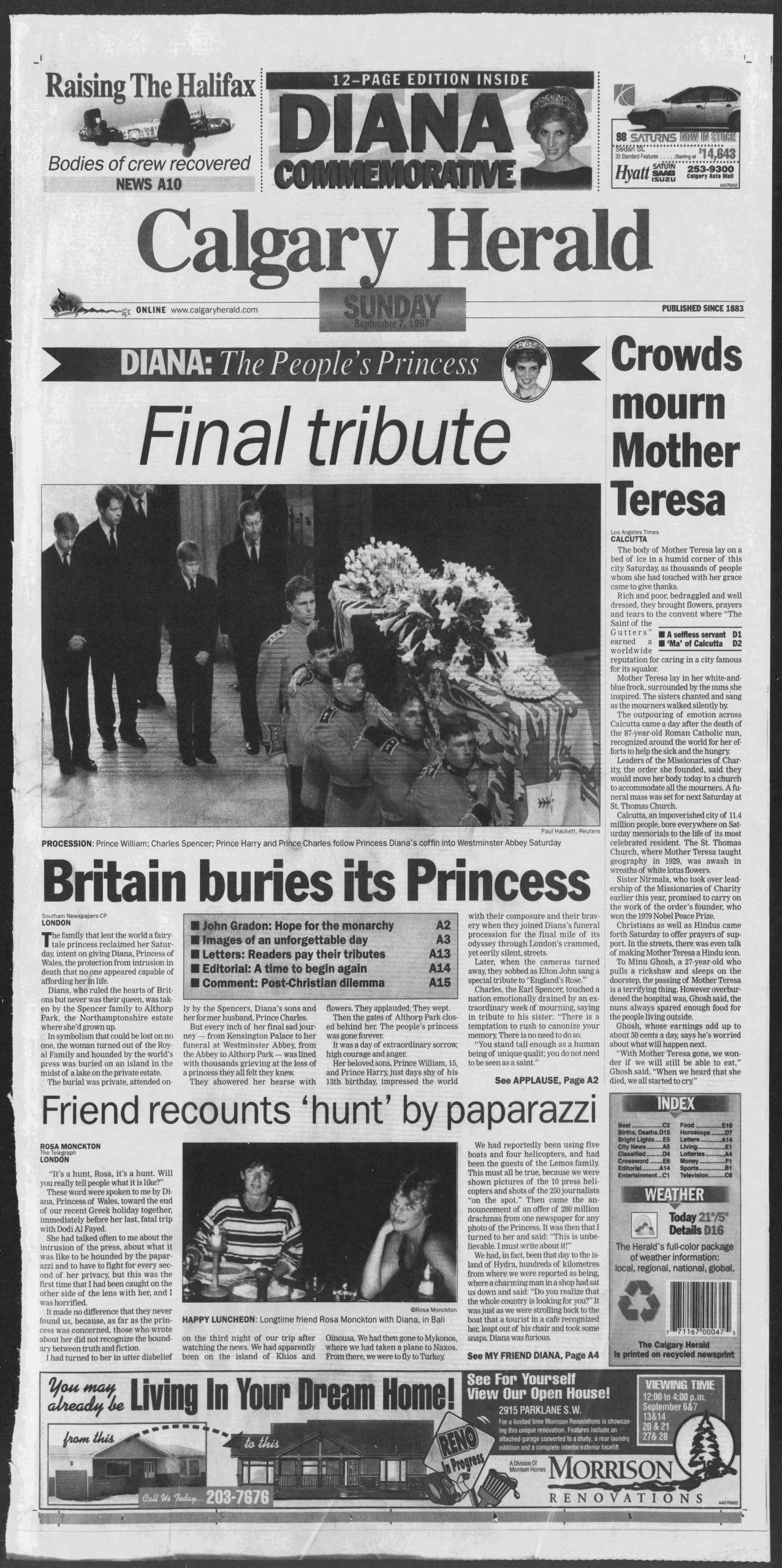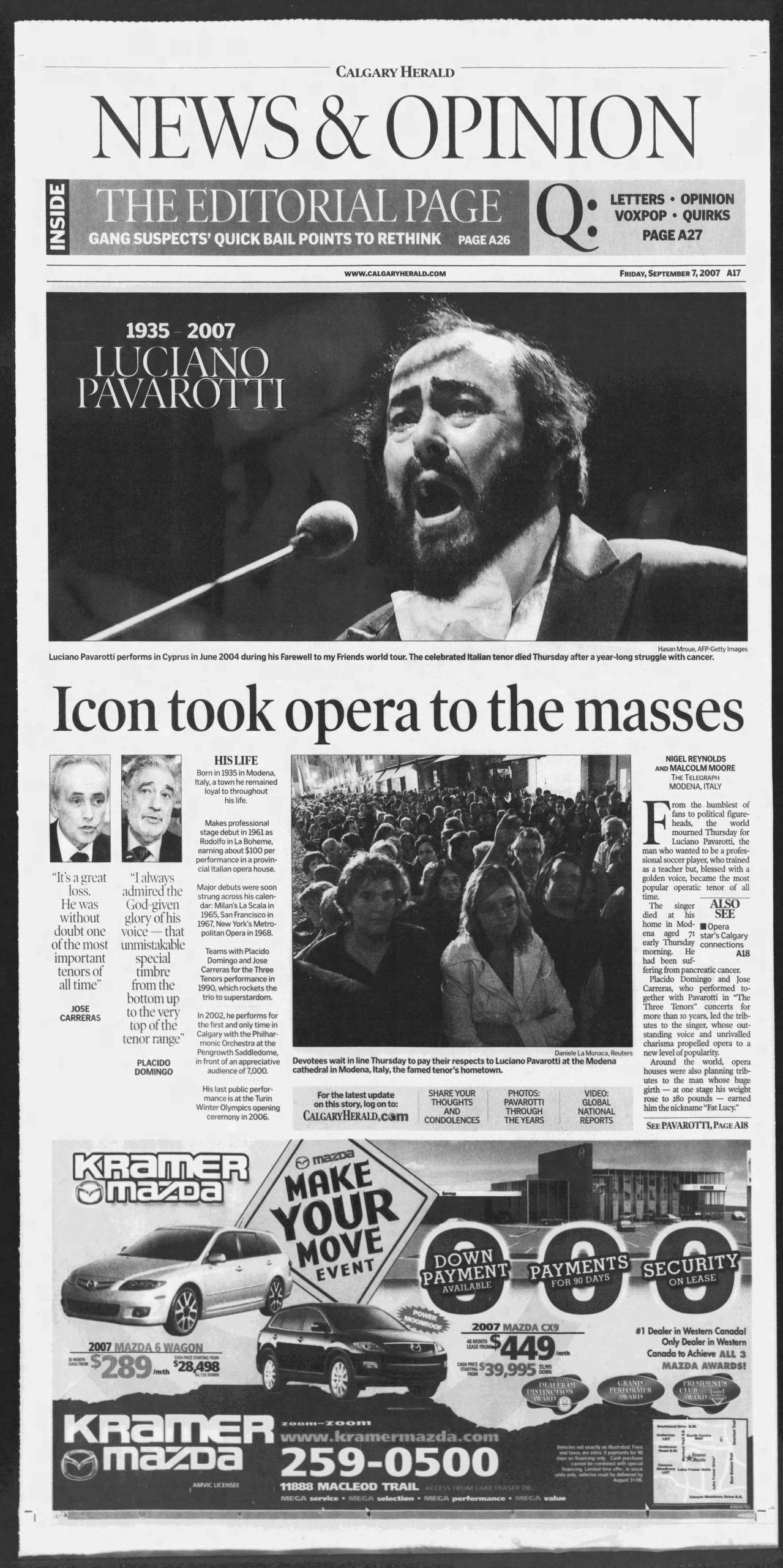Today in history: Pavarotti dies, Diana is buried and an American president is shot

Article content
On this date, Sept. 6, in history:
In 1298, the Genoese captured Marco Polo in a sea battle. While imprisoned, the explorer and trader met writer Rustichello of Pisa and together they began a book on Marco’s travels.
In 1522, Juan Sebastian Del Cano completed the first circumnavigation of the world. He returned to Seville, Spain, with 20 crew and one ship. They had left three years earlier with five ships and 270 men under the command of Ferdinand Magellan.
In 1566, Turkish sultan Suleiman the Magnificent died in Hungary.
In 1620, the Pilgrims, the English Puritan settlers of the colony of Plymouth, Mass., sailed in the Mayflower from Plymouth, England, to seek freedom of worship for their own faith. Three months later, they landed at Plymouth Rock in present-day Massachusetts.
In 1666, The Great Fire of London ended after destroying much of the city over the previous five days.
In 1869, a mine disaster at Plymouth, Pa., took 179 lives.
In 1888, Joseph P. Kennedy, the businessman and diplomat who founded an American political dynasty, was born.
In 1900, W.A.C. Bennett, premier of British Columbia from 1952-72, was born. He died on Feb. 23, 1979.
In 1901, U.S. President William McKinley was shot and mortally wounded by anarchist Leon Czolgosz at the Pan-American Exposition in Buffalo, N.Y. McKinley’s wounds seemed to be healing but gangrene set in and he died on Sept. 14. Until the assassination, little security was provided for American presidents.
In 1909, American explorer Robert Peary sent word from Labrador that he had reached the North Pole five months previously.
In 1920, station WWJ in Detroit carried the first radio broadcast of a professional boxing match. Jack Dempsey knocked out Billy Miske in the third round.
In 1927, movie houses remained closed across the United States to mourn the death of film mogul Marcus Loew.
In 1948, Princess Juliana of the Netherlands was inaugurated as queen, two days after the abdication of her mother, Queen Wilhelmina.
In 1952, the CBC opened the first television broadcasting facilities in Canada. The first station was CBFT in Montreal, which was followed by CBLT in Toronto two days later. Both outlets originally broadcast 18 hours of programming a week. Following its mandate that “television in Canada should be essentially Canadian,” the CBC at that time ensured that 60 per cent of its programs were produced in Canada. There were only about 100,000 TV sets in Canada at that time.
In 1953, 30 Canadians were released in the final exchange of Korean War prisoners.
In 1957, former prime minister Louis St. Laurent stepped down as leader of the Liberal party. He served as prime minister from 1948 until his party’s defeat in a general election three months before.
In 1964, U.S. President Lyndon Johnson handed B.C. Premier W.A.C. Bennett a cheque for $273 million regarding the Columbia River Power agreement.
In 1966, South African Prime Minister Hendrik Verwoerd was assassinated during a parliamentary session in Cape Town. The assassin was a drifter who claimed the government was doing too much for the non-whites and not enough for the “poor whites.”
In 1968, Swaziland became an independent member of the British Commonwealth.
In 1975, more than 2,300 people were killed in an earthquake in eastern Turkey.
In 1975, Czechoslovak-born tennis star Martina Navratilova requested political asylum in the U.S. during the U.S. Open in New York.
In 1977, highway signs across Canada, except in Quebec and Nova Scotia, were converted to metric.
In 1977, Canadian author Leslie MacFarlane died in Whitby, Ont. He was 74. He wrote the first 20 books of The Hardy Boys adventure series.
In 1981, in Poland, the Solidarity union held the first independent labour congress ever staged in the Soviet bloc. Union leaders released statements declaring that revolution was under way in Poland.
In 1987, SaskWest Television became the first television company in Canada to put out two simultaneous air signals in two different cities, Regina and Saskatoon.
In 1990, one of Canada’s biggest political upsets saw Ontario elect its first NDP government. Bob Rae’s New Democrats ousted David Peterson’s Liberals, winning 74 of 130 seats. The Rae government lasted only one term, losing the 1995 election to the Conservatives under Mike Harris.
In 1991, the Soviet Union granted full independence to the three Baltic republics — Estonia, Latvia and Lithuania. Another legacy of Communist rule also disappeared — parliament voted to restore the pre-Bolshevik name of St. Petersburg to the country’s second-largest city — Leningrad.
In 1995, Dudley George, one of a group of aboriginal protesters occupying Ipperwash Provincial Park on Lake Huron in Ontario, was shot dead by police. The protesters were claiming the park occupied a sacred burial ground. (A police officer was later convicted of criminal negligence causing death).
In 1995, Baltimore Orioles shortstop Cal Ripken Jr. eclipsed Yankee great Lou Gehrig’s ironman record by playing in his 2,131st straight game. (Ripken extended the record to 2,632 games before sitting out a game against the Yankees on Sept. 21, 1998.)
In 1997, about one million people lined the streets of London as the funeral procession of Diana, Princess of Wales, made its journey from Kensington Palace to Westminster Abbey. For the first time in history, the Union Jack flew at half-staff above Buckingham Palace to mark the passing of someone who was not a member of the royal family.
In 1998, in the first dynastic succession in any Communist country, Kim Jong-il was entrenched officially as North Korea’s supreme leader, heading the state, the military and the governing Workers party.
In 2005, California’s State Assembly became the first legislative body in the U.S. to approve same-sex marriages, but Gov. Arnold Schwarzenegger later vetoed the bill.
In 2005, Eugenia Charles, former prime minister of Dominica, the world’s first black female head of a country, died at age 86.
In 2007, Italian Opera legend Luciano Pavarotti died after a battle with pancreatic cancer. He was 71.
In 2009, Maj. Yannick Pepin, 36, and Cpl. Jean-Francois Drouin, 31, both members of the 5 Combat Engineer Regiment who were stationed in Valcartier, Que., were killed when a roadside bomb hit their armoured vehicle in the Dand district southwest of Kandahar city in Afghanistan.
In 2011, Germany’s top criminal court threw out the tax evasion conviction of former arms-industry lobbyist Karlheinz Schreiber and ordered a retrial after saying errors were made in the 2010 process. The German-Canadian former arms industry lobbyist had been extradited to Germany after an Ontario court denied his bid to stay in Canada following public hearings into his controversial financial dealings with former prime minister Brian Mulroney. (In late 2013, he was again found guilty and sentenced to six-and-a-half years in prison.)
In 2011, former media baron Conrad Black returned to a low security Miami prison to complete the last 13 months of his sentence. He had been free on bail for about a year after an appeal court reversed two of his three fraud convictions.
In 2011, a man with an AK-47 assault rifle shot a group of five uniformed National Guard members eating breakfast at a Nevada restaurant, killing three of them and another person. Seven others were wounded. The suspect shot himself and later died at a hospital.
In 2014, former federal cabinet minister Jim Prentice won the Alberta Progressive Conservative leadership race to become premier-designate, replacing Alison Redford who had resigned amid a travel expense scandal. On Oct. 27, Prentice won a seat in the legislature as his party won four provincial byelections. (In May 2015, the NDP won the Alberta election, toppling the PC dynasty and driving Prentice from politics.)
In 2017, the Bank of Canada raised its overnight lending rate to 1.0 per cent, its second quarter-point increase since July.
In 2017, Category 5 hurricane Irma, the strongest Atlantic Ocean hurricane ever recorded with wind gusts of 298 km, made landfall as it passed the Caribbean islands of Antigua and Barbuda. Its 640-km path continued over Puerto Rico and Cuba before slamming the Gulf Coast of Florida as a Category 4 storm on Sept. 10 and weakening to a tropical depression through the U.S. southeast. Irma killed 38 people in the Caribbean and another 36 in the U.S.
In 2018, India’s Supreme Court struck down a colonial-era law that made gay sex punishable by up to 10 years in prison, a landmark victory for gay rights that one judge said would “pave the way for a better future.”
In 2018, film and TV star Burt Reynolds died at age 82. Reynolds enjoyed a prolific career with a mix of critically acclaimed roles including Deliverance and Boogie Nights and commercial hits such as The Cannonball Run and Smokey and the Bandit. He won an Emmy for the TV series Evening Shade.
In 2018, a powerful earthquake on Japan’s main northern island of Hokkaido triggered dozens of landslides that crushed houses under torrents of dirt, rocks and timber. After days of searches, Japanese authorities said 41 people had been killed and more than 650 were injured.
In 2018, a Dallas police officer shot and killed a 26-year-old man in his own apartment. Amber Guyger said she mistook his apartment for her own home and believed he was a burglar. Guyger was charged three days later with manslaughter and was fired on Sept. 24.
In 2018, a computer programmer who was working at the behest of the North Korean government was charged in connection with several massive cyberattacks, including the hack of Sony Pictures Entertainment in 2014 and the WannaCry ransomware attack that affected hundreds of thousands of computers.
In 2019, Robert Mugabe, who governed Zimbabwe for 37 years before being forced to resign in 2017, died at 95. Mugabe took a country shining with the promise of independence and left it economically shattered and in the grip of repression. There was mixed reaction in Zimbabwe to the news of his death, with some blaming him for the country’s economic turmoil and human rights violations and others saying life got worse after he left office.
In 2021, actor Michael K. Williams — who played the popular character Omar Little on The Wire — died suddenly. New York City police said Williams was found dead at his apartment in Brooklyn. He was 54. Williams created one of the most memorable characters in TV history on the HBO series, which ran from 2002 to 2008. Little was a robber of drug dealers who lived by a strict moral code and delivered some of the show’s most famous quotes, including: “All in the game.”
—-











Postmedia is committed to maintaining a lively but civil forum for discussion. Please keep comments relevant and respectful. Comments may take up to an hour to appear on the site. You will receive an email if there is a reply to your comment, an update to a thread you follow or if a user you follow comments. Visit our Community Guidelines for more information.